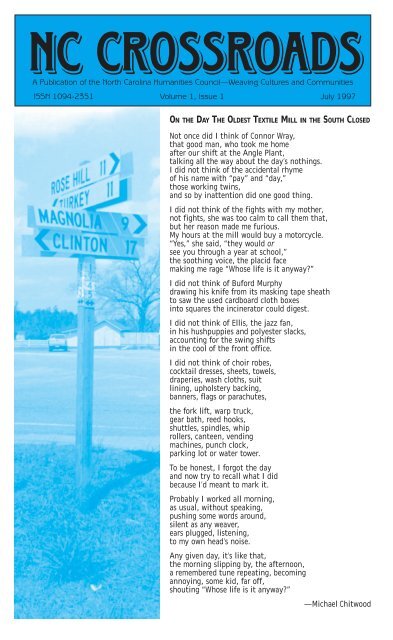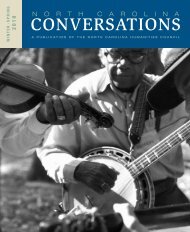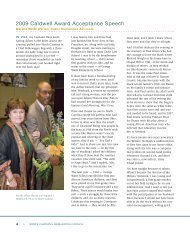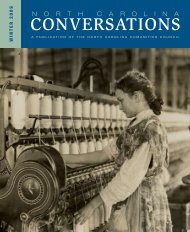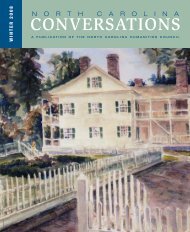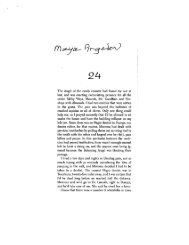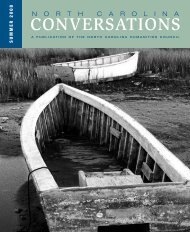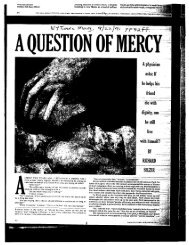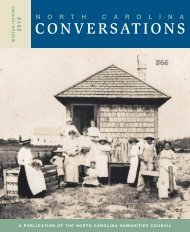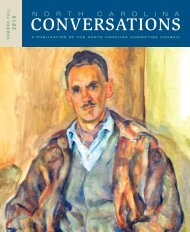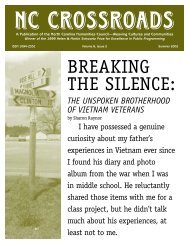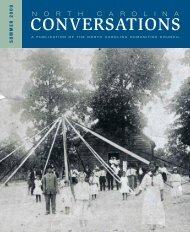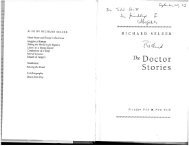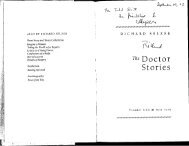A Publication of the North Carolina Humanities Council—Weaving ...
A Publication of the North Carolina Humanities Council—Weaving ...
A Publication of the North Carolina Humanities Council—Weaving ...
Create successful ePaper yourself
Turn your PDF publications into a flip-book with our unique Google optimized e-Paper software.
NC Crossroads<br />
A <strong>Publication</strong> <strong>of</strong> <strong>the</strong> <strong>North</strong> <strong>Carolina</strong> <strong>Humanities</strong> <strong>Council—Weaving</strong> Cultures and Communities<br />
ISSN 1094-2351 Volume 1, Issue 1 July 1997<br />
ON THE DAY THE OLDEST TEXTILE MILL IN THE SOUTH CLOSED<br />
Not once did I think <strong>of</strong> Connor Wray,<br />
that good man, who took me home<br />
after our shift at <strong>the</strong> Angle Plant,<br />
talking all <strong>the</strong> way about <strong>the</strong> day’s nothings.<br />
I did not think <strong>of</strong> <strong>the</strong> accidental rhyme<br />
<strong>of</strong> his name with “pay” and “day,”<br />
those working twins,<br />
and so by inattention did one good thing.<br />
I did not think <strong>of</strong> <strong>the</strong> fights with my mo<strong>the</strong>r,<br />
not fights, she was too calm to call <strong>the</strong>m that,<br />
but her reason made me furious.<br />
My hours at <strong>the</strong> mill would buy a motorcycle.<br />
“Yes,” she said, “<strong>the</strong>y would or<br />
see you through a year at school,”<br />
<strong>the</strong> soothing voice, <strong>the</strong> placid face<br />
making me rage “Whose life is it anyway”<br />
I did not think <strong>of</strong> Buford Murphy<br />
drawing his knife from its masking tape sheath<br />
to saw <strong>the</strong> used cardboard cloth boxes<br />
into squares <strong>the</strong> incinerator could digest.<br />
I did not think <strong>of</strong> Ellis, <strong>the</strong> jazz fan,<br />
in his hushpuppies and polyester slacks,<br />
accounting for <strong>the</strong> swing shifts<br />
in <strong>the</strong> cool <strong>of</strong> <strong>the</strong> front <strong>of</strong>fice.<br />
I did not think <strong>of</strong> choir robes,<br />
cocktail dresses, sheets, towels,<br />
draperies, wash cloths, suit<br />
lining, upholstery backing,<br />
banners, flags or parachutes,<br />
<strong>the</strong> fork lift, warp truck,<br />
gear bath, reed hooks,<br />
shuttles, spindles, whip<br />
rollers, canteen, vending<br />
machines, punch clock,<br />
parking lot or water tower.<br />
To be honest, I forgot <strong>the</strong> day<br />
and now try to recall what I did<br />
because I’d meant to mark it.<br />
Probably I worked all morning,<br />
as usual, without speaking,<br />
pushing some words around,<br />
silent as any weaver,<br />
ears plugged, listening,<br />
to my own head’s noise.<br />
Any given day, it’s like that,<br />
<strong>the</strong> morning slipping by, <strong>the</strong> afternoon,<br />
a remembered tune repeating, becoming<br />
annoying, some kid, far <strong>of</strong>f,<br />
shouting “Whose life is it anyway”<br />
—Michael Chitwood
“a sense <strong>of</strong> community”<br />
Over in <strong>the</strong> 100 alley <strong>of</strong> <strong>the</strong> weave room, I could see two members <strong>of</strong> <strong>the</strong> Glade Hill Rescue<br />
Squad trying to discuss something in <strong>the</strong> loom roar. In <strong>the</strong> 400 alley, a soprano and a<br />
baritone from <strong>the</strong> Redwood Methodist Church Choir tended to troublesome sample<br />
runs. rom where I sat on my wobbly scaffolding over <strong>the</strong> looms, I could see husband<br />
and wife, fa<strong>the</strong>r and son, right fielders and <strong>the</strong>ir short stops, deer hunters, Ruritans and women <strong>of</strong><br />
<strong>the</strong> Be<strong>the</strong>l Baptist Ladies Auxiliary—in short I could see dozens <strong>of</strong> kinds <strong>of</strong> allegiances, bonds <strong>of</strong><br />
both blood and belief. And, I was about to see those bonds tested.<br />
It was <strong>the</strong> summer <strong>of</strong> 1978, and I was spending my college break working in <strong>the</strong> maintenance<br />
department <strong>of</strong> <strong>the</strong> textile mill in my hometown. I’d been assigned to clean <strong>the</strong> tin shades and<br />
replace flickering fluorescent tubes in <strong>the</strong> lights above <strong>the</strong> thrashing Draper looms <strong>of</strong> <strong>the</strong> mill’s<br />
weave rooms. It was a typical sou<strong>the</strong>rn summer, drenched with humidity which was exaggerated<br />
by <strong>the</strong> water jets in <strong>the</strong> ceiling <strong>of</strong> <strong>the</strong> weave room that kept <strong>the</strong> yarn from raveling. There was talk <strong>of</strong><br />
s<strong>of</strong>tball games, NASCAR wins, quarts <strong>of</strong> beans canned and one o<strong>the</strong>r thing—<strong>the</strong> thing that would<br />
strain <strong>the</strong> bonds that years <strong>of</strong> familiarity had fashioned—<strong>the</strong> union.<br />
This particular summer <strong>the</strong> Amalgamated Clothing and Textile Workers’ Union (ACTWU) had<br />
targeted this mill for organization. rom my catbird seat above <strong>the</strong> looms, I watched union<br />
advocates work <strong>the</strong> weave room, convincing some, alienating o<strong>the</strong>rs, and I watched <strong>the</strong><br />
management, who shared with <strong>the</strong> weave rooms’ workers many <strong>of</strong> <strong>the</strong> allegiances <strong>of</strong> church and<br />
community, work against <strong>the</strong> union. As <strong>the</strong> “college boy,” I was one <strong>of</strong> <strong>the</strong>m and not one <strong>of</strong> <strong>the</strong>m,<br />
with <strong>the</strong>m and, literally, removed from <strong>the</strong>m. At <strong>the</strong> time I understood little <strong>of</strong> what I was witnessing,<br />
but <strong>the</strong> images <strong>of</strong> <strong>the</strong>ir daily lives stayed with me.<br />
Nearly 20 years later I was visiting with my fa<strong>the</strong>r, who had retired from his position as <strong>the</strong> mill’s<br />
personnel manager. I asked him to take me back into <strong>the</strong> mill. As we walked through <strong>the</strong> weave<br />
rooms and he shook hands and squeezed shoulders, leaned close to people’s ears to shout through<br />
<strong>the</strong> loom roar, <strong>the</strong> images rushed back to me and I began to see <strong>the</strong>m in <strong>the</strong> context <strong>of</strong> this vital<br />
community whose bonds had held up under <strong>the</strong> strain <strong>of</strong> social and economic conflict. The poems<br />
printed here, along with o<strong>the</strong>rs which form a book called The Weave Room (University <strong>of</strong> Chicago<br />
Press, 1998), began flooding my daily writing. or three months, <strong>the</strong>y poured; <strong>the</strong>y troubled my<br />
sleep; <strong>the</strong>y wouldn’t leave me alone. Later, when I told a friend, with some embarrassment, that I’d<br />
written <strong>the</strong> first draft in about three months, she said “Gee, it only took you three months—and<br />
twenty years.”<br />
She was right. It had taken me nearly two decades to climb a different kind <strong>of</strong> scaffolding and<br />
get <strong>the</strong> perspective I needed to honor that community in all its complexity, humor, determination<br />
and humanity. What I’m after here is not to “take” <strong>the</strong> pictures <strong>of</strong> weavers, cloth d<strong>of</strong>fers, fixers and<br />
even personnel managers, but, finally, to give <strong>the</strong>m back.<br />
—Michael Chitwood
MEETING<br />
This is one <strong>of</strong> several prose poems in <strong>the</strong> book, and like <strong>the</strong> o<strong>the</strong>rs is a monologue from one <strong>of</strong> <strong>the</strong> mill’s<br />
many characters. The speaker recalls a particular incident in which an outsider runs head on into <strong>the</strong><br />
solidarity that living and working in this community has created.<br />
Called a big meeting for a Friday morning. Said we was to meet a man might be<br />
interested in buying our plant, man out <strong>of</strong> New York, or some such place, and when<br />
we all ga<strong>the</strong>red, <strong>the</strong> supervisors and foremen, Mr. Grey introduces him.<br />
He starts with You People this and You People that, saying we ran a tight ship and<br />
he admires a tight ship and that’s <strong>the</strong> only way to stay afloat, ha ha, in this<br />
industry today. He says he admires our “sense <strong>of</strong> community,” sticking toge<strong>the</strong>r<br />
and not needing a union to speak for us, and <strong>the</strong>n he says he could help us get<br />
even more efficient and everybody would pr<strong>of</strong>it from that, wouldn’t <strong>the</strong>y<br />
And <strong>the</strong>n Mason Herrick, <strong>the</strong> one who’s always putting a snake in somebody’s<br />
lunch box or sewing <strong>the</strong> grease rags toge<strong>the</strong>r, says why don’t we show him<br />
<strong>the</strong> weave room so he can see our operating procedures. Where Mason got words<br />
like that is a mystery to me.<br />
So we troop to No. 2 what was running fancy curtains for a New York flipwrist. We<br />
start walking <strong>the</strong> alleys, Mason pointing to different looms<br />
like this man knows heddles from drop wires and <strong>the</strong>n Mason leans to him<br />
and shouts something. The man looks like he wants to ask somebody else about<br />
what Mason said, but he can’t figure out how so he shrugs and takes <strong>the</strong> plugs out<br />
<strong>of</strong> his ears.<br />
Mason pulls us all aside one by one and shows us a note and when we came out <strong>of</strong><br />
<strong>the</strong> weave room, it’s all agreed. We start mouthing to each o<strong>the</strong>r<br />
like we’re talking big but <strong>of</strong> course not saying a thing and <strong>the</strong> man gets ashy<br />
colored and we’re mouthing “What’s wrong” and he takes <strong>of</strong>f for <strong>the</strong> <strong>of</strong>fice<br />
like a turpentined dog heading for home.<br />
Naturally he don’t buy <strong>the</strong> place, but <strong>the</strong> place, we all say, bought him and <strong>the</strong>n<br />
some and what he heard was “a sense <strong>of</strong> community.”
A WEAVER<br />
This is one <strong>of</strong> several portrait poems in <strong>the</strong> book. This<br />
contrasts, I hope, <strong>the</strong> difference between <strong>the</strong> life <strong>of</strong> <strong>the</strong><br />
person who is making <strong>the</strong> cloth and <strong>the</strong> lives <strong>of</strong> those who<br />
will use it. To my mind, <strong>the</strong> weaver’s is in many ways<br />
saner, not driven by <strong>the</strong> whims <strong>of</strong> fashion and status.<br />
Black warp, purple fill<br />
or bride’s white through white,<br />
she watches for seconds.<br />
She watches for broken ends.<br />
She adjusts <strong>the</strong> whip roller<br />
and jacks <strong>the</strong> speed.<br />
She will have her break.<br />
She will have her lunch,<br />
her cigarette.<br />
Black warp, purple fill cocktail<br />
or bride’s white through white,<br />
she will never have such dresses<br />
or <strong>the</strong>ir need.<br />
LOOMS<br />
The noise produced by two working weave rooms is deafening. That’s why hearing protection<br />
is mandated in <strong>the</strong> mills. But <strong>the</strong> sound can be heard a good distance from <strong>the</strong> mill and<br />
becomes a kind <strong>of</strong> constant, staticky soundtrack for <strong>the</strong> lives <strong>of</strong> <strong>the</strong> people. And, because<br />
<strong>the</strong> mills run three shifts, someone’s day is always ending, someone else’s beginning.<br />
Some dragging home from a card game,<br />
some after leaving <strong>the</strong> hospital where <strong>the</strong>y had sat in <strong>the</strong> dark beside a bed,<br />
some near dawn, on <strong>the</strong> way to a cold creek<br />
some on an early errand to take a dish to a dead aunt’s house,<br />
some driving a colicky baby around,<br />
some standing just outside <strong>the</strong> shaking doors, watching <strong>the</strong> third-shift moon<br />
grow pale,<br />
some when an unpaid bill goes again unpaid,<br />
some when an old one going or new one coming calls <strong>the</strong>m out,<br />
some who hope to hang a buck on <strong>the</strong> old swing set frame before<br />
evening,<br />
some squinting and guessing for <strong>the</strong> center line,<br />
some looking to catch somebody red-handed,<br />
some stalking a son or, worse yet, a daughter<br />
and some not knowing what <strong>the</strong>y seek when everyone else is sleeping<br />
hear <strong>the</strong>m singing,<br />
how <strong>the</strong>y fill up <strong>the</strong> day ending and beginning for miles.<br />
The Story, A Dress and Some Sheets and How No Lies Were Told<br />
These three poems are <strong>the</strong> story <strong>of</strong> a young woman who works in <strong>the</strong> weave room and finds herself<br />
pregnant and unmarried, which still carried a considerable stigma in <strong>the</strong> semi-rural mill towns <strong>of</strong><br />
THE CHOIR<br />
This poem shows one <strong>of</strong> <strong>the</strong> several<br />
kinds <strong>of</strong> bonds that existed in this closeknit<br />
community. The Wesley referred to<br />
is Charles Wesley, a famous Methodist<br />
hymn writer, and I hope <strong>the</strong> poem shows<br />
how interconnected all <strong>the</strong> parts <strong>of</strong> <strong>the</strong><br />
employees’ lives are.<br />
They sing around a song,<br />
warbly sixty-year-old altos,<br />
nasal tenors, shallow bass<br />
and those screeching sopranos.<br />
What wondrous love is this<br />
They roil <strong>the</strong> stream<br />
<strong>of</strong> Wesley’s pen<br />
<strong>the</strong> way <strong>the</strong> saved muddy<br />
with baptism a crystal creek.<br />
Their robes, which rolled<br />
from <strong>the</strong>ir own shrill<br />
air-jet looms,<br />
glisten, no defects<br />
in <strong>the</strong> sight <strong>of</strong> <strong>the</strong> Lord,<br />
no seconds in this l<strong>of</strong>t,<br />
and this sound is true<br />
as it is <strong>of</strong>f. Twice<br />
now this cloth<br />
has made a joyful noise,<br />
both times for a living.<br />
UNION SUMMER<br />
For and against,<br />
behind backs, this said,<br />
not that said.<br />
Union talk splintered<br />
s<strong>of</strong>t ball teams,<br />
congregations,<br />
all that had been toge<strong>the</strong>r<br />
coming apart<br />
“for <strong>the</strong> good <strong>of</strong> all.<br />
How long will you use<br />
up your lives<br />
to make <strong>the</strong>m rich”<br />
Them. Us.<br />
Behind backs, this said<br />
not that said.<br />
Shop talk ruined<br />
choir practice,<br />
hymns stalled
WINDOWS<br />
Because <strong>the</strong>y let in<br />
light that would fade <strong>the</strong> cloth<br />
and, in summer, heat<br />
that would fray <strong>the</strong> yarn,<br />
<strong>the</strong>y were sealed.<br />
But <strong>the</strong> newer bricks show<br />
clearly where <strong>the</strong>y had been.<br />
The one I can see through<br />
is in this Friday envelope,<br />
my name cloudy under cellophane.<br />
Behind “Pay to <strong>the</strong> Order <strong>of</strong>” I live<br />
and <strong>the</strong>se solid red numbers<br />
show clearly where I’ve been.<br />
Union and Union Summer<br />
The irony <strong>of</strong> attempted unionization in a community already tightly formed<br />
was that <strong>the</strong> thing that was supposed to bring people toge<strong>the</strong>r, <strong>the</strong> union,<br />
caused much discord. These two poems show some <strong>of</strong> <strong>the</strong> tensions as <strong>the</strong>y<br />
are felt along <strong>the</strong> myriad connections within <strong>the</strong> weave room. The vows <strong>of</strong><br />
this abortive wedding were sometimes heated and pr<strong>of</strong>ane.<br />
UNION<br />
What I remember <strong>of</strong> holding my fa<strong>the</strong>r’s hand is that I felt what wasn’t as<br />
much as what was. Not a single finger had been left whole by his hours at<br />
Bald Knob Furniture. And I can not forget <strong>the</strong> story <strong>the</strong> men, his friends, on<br />
Needmore Hill told <strong>of</strong> his first time, at <strong>the</strong> table saw, only 20, but moving up,<br />
no longer tailing <strong>the</strong> rip saws, folks already talking <strong>of</strong> his being made<br />
foreman. His left index slipped in, and prong, wrong sound <strong>of</strong> <strong>the</strong> saw finding<br />
something that wasn’t wood.<br />
When people looked around, he was sitting, legs spread, in <strong>the</strong> sawdust his<br />
morning had made, clutching a piece <strong>of</strong> himself so that <strong>the</strong>y had to pry his<br />
fingers open to take it from him. And soon after he started talking union.<br />
Never made foreman. When a heart attack found him still at <strong>the</strong> table saw,<br />
<strong>the</strong> boss said <strong>the</strong>y wouldn’t be able to hold his job.<br />
So that’s what union talk gets you and when <strong>the</strong> ACTWU man came sniffing<br />
around our s<strong>of</strong>tball games like he couldn’t see <strong>the</strong> company name stitched to<br />
all our backs, I told him union was just a word and words don’t come by with<br />
a dish when someone’s mo<strong>the</strong>r dies and come Sunday he’d find this same<br />
gang in <strong>the</strong> pews at Redwood Methodist and Calvary Baptist and that, my<br />
friend, was a blood bond and what a union was good for was getting people<br />
fired.<br />
But I began to see <strong>the</strong> little blue cards around <strong>the</strong> weave room, men tucking<br />
<strong>the</strong>m in shirt pockets, women slipping <strong>the</strong>m into purses. If enough were
finds that <strong>the</strong> mill’s bonds are strong (A Dress and Some Sheets) and that <strong>the</strong> women in<br />
particular share an almost mystical sisterhood with her (How No Lies Were Told).<br />
THE STORY<br />
“You don’t see young ones what<br />
talk to <strong>the</strong>y selves so much,”<br />
<strong>the</strong> supervisor observes.<br />
“Somebody got into her<br />
pockets bad.”<br />
She told it to her<br />
breakdowns, knocked-out<br />
ends,<br />
drop wires and whip rollers,<br />
told it to warps and heddles,<br />
her mouth and hands moving<br />
toge<strong>the</strong>r,<br />
working <strong>the</strong> mistakes, <strong>the</strong> defects,<br />
<strong>the</strong> ruined pattern.<br />
And she would tell you, if you’d ask<br />
or just sit still<br />
in <strong>the</strong> canteen or <strong>the</strong> ladies room<br />
or try to scream it to you over <strong>the</strong><br />
thrash <strong>of</strong> <strong>the</strong> looms.<br />
But mostly she told it to herself,<br />
and even she couldn’t hear it,<br />
but could feel <strong>the</strong> words buzzing<br />
like hornets in her chest’s angry nest.<br />
A DRESS AND SOME SHEETS<br />
In her third month,<br />
she found <strong>the</strong>m<br />
in a bag with her name pinned on,<br />
by her pocketbook in <strong>the</strong> locker room.<br />
The dress, home-made with perfect<br />
stitching<br />
only one or two <strong>the</strong>re could have<br />
done,<br />
and <strong>the</strong> sheets, 250 count, first run,<br />
<strong>the</strong> best <strong>the</strong>y made.<br />
No o<strong>the</strong>r card<br />
and no one would say<br />
who or why<br />
though she knew<br />
it was from all <strong>of</strong> <strong>the</strong>m<br />
because <strong>the</strong>y were hers<br />
and she was <strong>the</strong>irs,<br />
<strong>the</strong> best <strong>the</strong>y made.<br />
HOW NO LIES WERE TOLD<br />
Six months gone,<br />
she started up<br />
in <strong>the</strong> employee discount store,<br />
at <strong>the</strong> seconds table,<br />
a kind <strong>of</strong> singing, keen<br />
like tin ripping in a big wind.<br />
She made for No. 2, screaming,<br />
“No more lies,<br />
I don’t want to hear no more lies.”<br />
She threw her earplugs in <strong>the</strong> sand<br />
bucket,<br />
went down <strong>the</strong> 300 alley<br />
and squatted by a sample run.<br />
How <strong>the</strong>y knew,<br />
so quickly and from all over,<br />
<strong>the</strong>y would not be able to say,<br />
but <strong>the</strong> cloth room emptied,<br />
<strong>the</strong> canteen, drawing-in.<br />
Women came putting hands to ears,<br />
pushing in <strong>the</strong> plugs,<br />
volunteering to be deaf.<br />
They came to her<br />
and because <strong>the</strong>y knew<br />
<strong>the</strong>re was nothing<br />
she could hear<br />
<strong>the</strong>y squatted with her,<br />
among those strands<br />
<strong>the</strong> noise was making<br />
come toge<strong>the</strong>r.<br />
when bass and tenor<br />
couldn’t harmonize<br />
for worldly reason.<br />
“Would you trade<br />
one boss for two<br />
Pay dues and taxes”<br />
One for two,<br />
for all,<br />
this said, not that.<br />
Their livings’ room<br />
grew raucous with looks.<br />
The wedding wouldn’t<br />
take. But <strong>the</strong> living<br />
with this said,<br />
not that said, <strong>the</strong> vows<br />
sworn at friends,<br />
not friends, was<br />
for better and worse.<br />
SINGING THE “UNION SONG” FOR<br />
THE COMPANY MAN<br />
It didn’t matter that I’d seen<br />
him waltz Mo<strong>the</strong>r around <strong>the</strong><br />
kitchen,<br />
singing “Hey, hey, good-looking,<br />
whatcha<br />
got cooking,” her batting at him<br />
with <strong>the</strong> lid <strong>of</strong> <strong>the</strong> bean pot,<br />
laughing, saying stop, meaning<br />
don’t. The pen’s flew<br />
from his pocket shield on <strong>the</strong> dip.<br />
It didn’t matter that he put me<br />
on his back and carried both poles,<br />
<strong>the</strong> stringer, <strong>the</strong> light and me<br />
up <strong>the</strong> dark river bank.<br />
My hands clasped at his throat<br />
could feel “Amazing Grace”<br />
as he hummed it.<br />
It didn’t matter that he said “Stop”<br />
and meant it. I’d get him going,<br />
devil him, with that song,<br />
“Look for <strong>the</strong> Union label,”<br />
trying out <strong>the</strong> Political Science<br />
I was learning on his tab.<br />
He suffered my innocence,<br />
knowing, I guess, how a tune<br />
can turn, worm in, begin to gnaw.<br />
The<br />
jack<br />
whe<br />
“Di<br />
did<br />
Som<br />
I w<br />
But<br />
com<br />
man<br />
tha<br />
and<br />
but<br />
The<br />
rack<br />
and<br />
Mr.<br />
lost<br />
And<br />
loom
Then <strong>the</strong> ACTWU started standing outside <strong>the</strong> gate with leaflets and lettered<br />
jackets asking us to choose up teams. More than one who dropped <strong>the</strong> leaflet<br />
when <strong>the</strong> boss was looking signed <strong>the</strong> card when he wasn’t.<br />
“Did <strong>the</strong>y think Greenville wouldn’t notice,” I said in <strong>the</strong> canteen. “New York<br />
didn’t give a rat’s ass whe<strong>the</strong>r <strong>the</strong> cloth came from Angle or Yokohama.”<br />
Some said that was right, but o<strong>the</strong>rs said <strong>the</strong>y wanted more, better, and that<br />
I was an ass kisser, looking to make supervisor.<br />
But for or against, we didn’t expect what happened. The ties from Greenville<br />
coming down <strong>the</strong> alleys in both weave rooms, shutting <strong>of</strong>f <strong>the</strong> looms. How<br />
many times had we heard it would be cheaper to replace a whole shift<br />
than shut <strong>of</strong>f <strong>the</strong> looms In both rooms, <strong>the</strong>y were shutting <strong>of</strong>f now,<br />
and it was done one at a time, not easy by throwing <strong>the</strong> main switch,<br />
but slow so we would get <strong>the</strong> full effect.<br />
Then we were invited to <strong>the</strong> slasher room where <strong>the</strong>y’d cleared out <strong>the</strong> warp<br />
racks and set up tables, covered in good linen. They’d brought in barbecue<br />
and tubs <strong>of</strong> sodas.<br />
Mr. Goldman from Greenville had a few words about our good work, lack <strong>of</strong><br />
lost-time accidents, and we were told to help our selves, just help our selves.<br />
And we did, but not to praise or pig but to that sound, that quiet <strong>of</strong> <strong>the</strong><br />
looms not running, not what was <strong>the</strong>re, but what wasn’t.<br />
FOR<br />
,<br />
ip.<br />
les,<br />
top”<br />
,<br />
w.<br />
Just as a muscle is most visible when under strain, <strong>the</strong> stresses <strong>of</strong> <strong>the</strong> effort to<br />
unionize <strong>the</strong> mill revealed <strong>the</strong> many strong bonds in this textile community. Some<br />
snapped under <strong>the</strong> pressure, but most did not. The union, finally, was not able to<br />
get enough votes to organize <strong>the</strong> plant. During <strong>the</strong> buyouts <strong>of</strong> <strong>the</strong> 1980s, <strong>the</strong> mill’s<br />
parent company was bought and <strong>the</strong>n <strong>the</strong> buying company was taken over. The<br />
plant, under a new name, is still in operation and a goodly number <strong>of</strong> <strong>the</strong> employees<br />
I knew 20 years ago are still <strong>the</strong>re. Whe<strong>the</strong>r to labor unions or high-rolling<br />
corporations, <strong>the</strong>y seem to have<br />
been saying <strong>the</strong> same thing for <strong>the</strong><br />
last two decades—you will never<br />
<strong>of</strong>fer us anything stronger than<br />
<strong>the</strong> bond <strong>of</strong> our shared lives.<br />
What you can still hear in <strong>the</strong> roar<br />
<strong>of</strong> <strong>the</strong> looms is “a sense <strong>of</strong><br />
community.”<br />
NC Crossroads<br />
is a publication <strong>of</strong> <strong>the</strong><br />
<strong>North</strong> <strong>Carolina</strong> <strong>Humanities</strong> Council
About <strong>the</strong> Author <strong>of</strong> “A Sense <strong>of</strong> Community”<br />
John Rosenthal<br />
Michael Chitwood was born and raised in <strong>the</strong> foothills <strong>of</strong> <strong>the</strong> Virginia<br />
Blue Ridge, and is now a free-lance writer living in Chapel Hill, <strong>North</strong><br />
<strong>Carolina</strong>. His poetry and fiction have appeared in Poetry, Ohio Review,<br />
The Sou<strong>the</strong>rn Review, Threepenny Review, Virginia Quarterly Review,<br />
ield and numerous o<strong>the</strong>rs. Ohio Review Books has published two books<br />
<strong>of</strong> his poetry — Salt Works (1992) and Whet (1995). His third book, The<br />
Weave Room, will be published by The University <strong>of</strong> Chicago Press in<br />
<strong>the</strong> Phoenix Series (Spring, 1998). A book <strong>of</strong> essays will also be<br />
published by Down Home Press in 1998.<br />
He is a regular commentator for WUNC-M and a columnist for The<br />
Independent in Durham, NC. His book reviews have appeared in<br />
newspapers and magazines including <strong>the</strong> Greensboro News & Record,<br />
Charlotte Observer and Duke magazine.<br />
Chitwood is a graduate <strong>of</strong> Emory & Henry College (BA) and <strong>the</strong><br />
University <strong>of</strong> Virginia (MA).<br />
“A Sense <strong>of</strong> Community” is <strong>the</strong> inaugural issue <strong>of</strong><br />
NC CROSSROADS, a new publication <strong>of</strong> <strong>the</strong> <strong>North</strong><br />
<strong>Carolina</strong> <strong>Humanities</strong> Council (NCHC). Now<br />
celebrating its twenty-fifth year <strong>of</strong> service to our<br />
state, NCHC is a non-pr<strong>of</strong>it foundation and statebased<br />
affiliate <strong>of</strong> <strong>the</strong> National Endowment for <strong>the</strong><br />
<strong>Humanities</strong>. NCHC’s mission is to support public<br />
programs that address fundamental questions about<br />
who we as human beings are and how we can live<br />
toge<strong>the</strong>r in <strong>the</strong> world we all share.<br />
In 1997, NC CROSSROADS will explore <strong>the</strong> <strong>the</strong>me <strong>of</strong><br />
“Democratic Vistas: Citizenship and Communities in<br />
<strong>the</strong> 21st Century.” “Crossroads” evokes a wide range<br />
<strong>of</strong> meanings that are linked to human aspirations <strong>of</strong><br />
belonging to and being connected with a place and<br />
people. A crossroads can be an intersection at<br />
which we must choose one path and place or<br />
ano<strong>the</strong>r, or it can be a meeting place where<br />
different possibilities collide, conflict, compete,<br />
cooperate and realign. Always, we connect this<br />
place <strong>of</strong> intersection to <strong>the</strong> movement among past,<br />
present and future, assessing what to hold on to as<br />
we move on. We hope you enjoy this first issue <strong>of</strong><br />
NC CROSSROADS.<br />
For more information about NCHC and public<br />
humanities programs, write or call:<br />
<strong>North</strong> <strong>Carolina</strong> <strong>Humanities</strong> Council<br />
425 Spring Garden Street<br />
Greensboro, NC 27701<br />
910-334-5325<br />
For more information on<br />
life in sou<strong>the</strong>rn textile mills....<br />
Non-iction Books<br />
Byerly, Victoria Morris. Hard Times Cotton Mill Girls: Personal<br />
Histories <strong>of</strong> Womanhood and Poverty in <strong>the</strong> South. Ithaca: ILR<br />
Press, 1986.<br />
Clark, Daniel J. Like Night and Day: Unionization in a Sou<strong>the</strong>rn Mill<br />
Town. Chapel Hill: University <strong>of</strong> <strong>North</strong> <strong>Carolina</strong> Press, 1997.<br />
Glass, Brent D. The Textile Industry in <strong>North</strong> <strong>Carolina</strong>: A History.<br />
Raleigh: Division <strong>of</strong> Archives and History, <strong>North</strong> <strong>Carolina</strong><br />
Department <strong>of</strong> Cultural Resources, 1992.<br />
Hall, Jacquelyn Dowd, James Leloudis, Robert Korstad, Mary<br />
Murphy, LuAnn Jones, and Christopher B. Daly. Like a amily: The<br />
Making <strong>of</strong> a Sou<strong>the</strong>rn Cotton Mill World. Chapel Hill: The<br />
University <strong>of</strong> <strong>North</strong> <strong>Carolina</strong> Press, 1987.<br />
Hinson, Betty, editor. rom this Red Clay Hillside: Stories <strong>of</strong><br />
amilies from a <strong>North</strong> <strong>Carolina</strong> Cotton Mill Village. Belmont, NC:<br />
Spindle Books, 1997.<br />
Salmond, John A. Gastonia, 1929: The Story <strong>of</strong> <strong>the</strong> Loray Mill Strike.<br />
Chapel Hill: University <strong>of</strong> <strong>North</strong> <strong>Carolina</strong> Press, 1995.<br />
Tullos, Allen. Habits <strong>of</strong> Industry: White Culture and <strong>the</strong><br />
Transformation <strong>of</strong> <strong>the</strong> <strong>Carolina</strong> Piedmont. Chapel Hill: University<br />
<strong>of</strong> <strong>North</strong> <strong>Carolina</strong> Press, 1989.<br />
iction Books<br />
Lumpkin, Grace. To Make My Bread. New York: The Macaulay<br />
Company, 1932.<br />
Secreast, Donald. The Rat Becomes Light. New York: Harper &<br />
Row, 1990.<br />
ilms<br />
Norma Rae [videocassette]/ Twentieth Century ox; Produced by<br />
Tamara Asseyev and Alex Rose; Directed by Martin Ritt. armington<br />
Hills, Michigan, 1982.<br />
The Uprising <strong>of</strong> ‘34. Produced by George Stoney and Judith Helfand<br />
for <strong>the</strong> Research Consortium for <strong>the</strong> Southwide Textile Strike <strong>of</strong><br />
1934. Available through irst Run/Icarus ilms, New York, NY.<br />
NC Crossroads<br />
Editor: Mary Lee Kerr<br />
Copy Editor: Ka<strong>the</strong>rine M. Kubel<br />
Co-Editor: Harlan Joel Gradin<br />
Design & Production: PRINT TO IT<br />
Photo Credits:<br />
Cover photo by Rob Amberg. Meeting and Windows photos from <strong>the</strong> <strong>North</strong> <strong>Carolina</strong> Division <strong>of</strong> Archives and History.<br />
All o<strong>the</strong>r photos by Earl Dotter.<br />
Thanks to Georgann Eubanks, Chair <strong>of</strong> NCHC, for <strong>the</strong> name NC CROSSROADS.<br />
On The Cover:<br />
Poem from The Weave Room by Michael Chitwood, (University <strong>of</strong> Chicago Press, 1998). This poem is from <strong>the</strong> third, and<br />
final, section <strong>of</strong> <strong>the</strong> book. It’s a section that brings <strong>the</strong> book into <strong>the</strong> present and reflects on what’s been remembered,<br />
and what’s been lost, in <strong>the</strong> nearly two decades since <strong>the</strong> action at <strong>the</strong> book’s core. I have changed, <strong>the</strong> South has<br />
changed and textile communities have changed. But <strong>the</strong> best <strong>of</strong> those remembered tunes are worth repeating.


